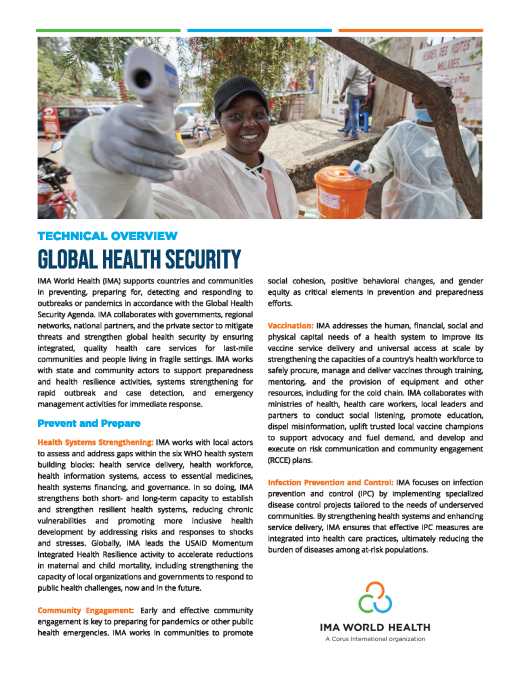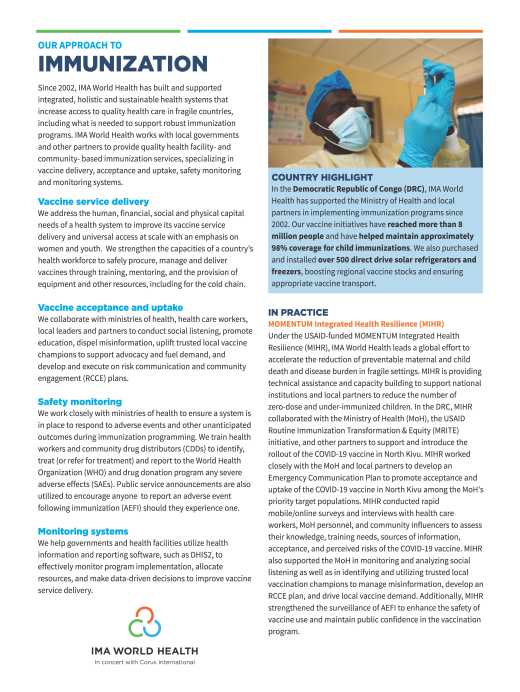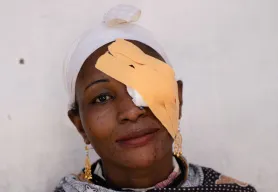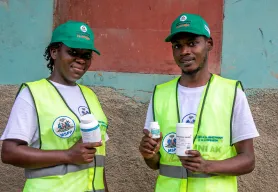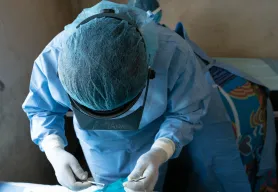Tanzania has made impressive progress in reducing its poverty rate in recently years. However, challenges such as poor infrastructure, low education levels and diseases remain and compound the burden of those still living in poverty. Only half of the population (54%) has access to improved drinking water, while only 24% has access to improved sanitation facilities. As such, maternal mortality, child mortality, HIV/AIDs, pneumonia, malaria and neglected tropical diseases (NTDs) are major issues for Tanzania's health system.
Since 1997, IMA World Health has collaborated with the Tanzanian Ministry of Health and local partners to address critical health needs with a focus on quality integrated service provision, health systems strengthening and healthy behaviors promotion. IMA World Health’s recent work in the country has included NTD control and management; childhood cancer; maternal and child health; childhood stunting; cervical cancer and more.
Project Highlights
IMA is implementing a UNICEF-funded project to accelerate nutrition outcomes through community-based approaches in the Njombe region of Tanzania. The project builds on the Tanzanian Government’s National Multisectoral Nutrition Action Plan (NMNAP), which targets the first thousand days from pregnancy through age two. This project takes a multi-sectoral approach to addressing poor nutrition by including nutrition-sensitive sectors, such as agriculture, education, WASH and early childhood development to establish sustainable, community-based interventions in six target districts. These interventions identify and treat children whose growth is faltering, help mothers initiate early and exclusive breastfeeding, educate and empower families to adopt optimal complementary feeding practices and support local government authorities to prioritize and allocate resources for coordinated nutrition activities. In addition to its close collaboration with the government, IMA is also engaging with the Partnership for Nutrition in Tanzania (PANITA), a local NGO, to lead its advocacy and capacity strengthening activities, and Lixil, a private corporation that uses technology and innovation to provide viable WASH solutions designed for developing markets, under this award. The project will support 32,000 children (0-24 months), 33,500 mothers and caregivers, 22,250 pregnant women, and 590 community health workers.
The Public Sector Systems Strengthening Plus (PS3+) project works with the Government of Tanzania (GOT) to institutionalize public sector systems that are responsive to citizens’ needs for essential quality public services across sectors at the local level, particularly for underserved populations. PS3+ strengthens GOT management systems, especially at the Local Government Authority (LGA) level and promotes increased citizen engagement in the transparent governance of public services. PS3+ focuses on extending interoperable systems, money and public workers to facilities to improve their autonomy, transparency, accountability and efficiency so they can provide high quality services to Tanzania’s citizens. IMA's role as a sub to Abt Associates on this USAID contract is to support citizen engagement and community mobilization, nutrition, agriculture and private sector engagement.
Funded by USAID and led by RTI International, the Act to End NTDs | East project assists national NTD control programs to eliminate and mitigate NTDs. IMA collaborated with Tanzania’s Ministry of Health to eliminate and control five NTDs endemic, including onchocerciasis (river blindness), lymphatic filariasis (LF), schistosomiasis, soil-transmitted helminths (STH) and trachoma. IMA World Health coordinated mass drug administrations (MDA) in 19 regions and 134 districts throughout Tanzania, training more than 3,400 front line health workers, 8,900 teachers and 35,700 community drug distributors to support treatment for over 20 million individuals annually. This project is a follow on of the ENVISION Project funded by USAID that was implemented by IMA in Tanzania from 2011 to 2019.
IMA World Health led the FCDO-funded Addressing Stunting in Tanzania Early, or ASTUTE, program. Our consortium, which included the Partnership for Nutrition in Tanzania, Cornell University’s Division of Nutritional Sciences, and Development Media International, strengthened the capacity of local government authorities to address child stunting and contribute to the evidence base for what works best and most cost-effectively in Tanzania.
ASTUTE was implemented in five regions of the Lake Zone: Kagera, Kigoma, Mwanza, Geita and Shinyanga. The project trained nearly 7,800 district health workers and non-health sector service providers and has reached 17.6 million nationally through mass media campaign. Additionally, 6.4 million mothers, caregivers and decision-makers benefited with improved child feeding information though home visits conducted by 6,000 community health workers.
As part of the project, IMA World Health created a toolkit to provide government, donors, non-governmental organisations, and civil society organisations (CSOs) with programming recommendations and tools to help implement successful multi-sectoral social and behaviour change (SBC) interventions aimed at preventing and reducing stunting.
Learn more: ASTUTE
With the financial support from SCI Foundation and in collaboration with the National NTD Control Program of Tanzania’s Ministry of Health, IMA World health conducted MDAs of school-aged children and implemented related activities for schistosomiasis (SCH) and soil transmitted helminthiasis (STH) prevention and treatment in 93 districts of 15 regions (partnering with 106 local government authorities – LGAs). Despite challenges posed by the COVID-19 pandemic, the project reached over 5,122,000 children achieving 95% MDA coverage rate. IMA provided technical assistance and supportive supervision at the regional and district levels and training to 1,748 master trainers, 6,647 front line health workers and 17,025 teachers.
Through the SAFE Project in Tanzania led by Sightsavers International, IMA World Health works with government authorities at all levels, health facilities and the Ministry of Health, Community Development, Gender, Elderly and Children (MOHCDGEC) to address the neglected tropical disease (NTD) trachoma, the world’s leading infectious cause of blindness. The project is funded by various donors including the Hilton Foundation and was historically funded by DFID/FCDO.
IMA World Health implements the project per the World Health Organization (WHO) guidelines based on four strategies to combat blinding trachoma: Surgery, Antibiotics, Facial cleanliness, and Environmental improvement. The SAFE Project facilitates trachomatous trichiasis (TT) surgery and covers five regions targeting 17 endemic districts with a population of more than 3.4 million and over 11,812 backlogged TT cases in Mtwara, Pwani, Kagera, Simiyu and Rukwa.
In addition to supporting the surgeries to address those backlogged TT cases, IMA World Health will train 28 surgeons to perform TT surgery, 153 eye care workers to assist in TT surgeries, and 365 ward and community-level leaders and 4,870+ finders/ hygiene counsellors in 1,740 villages to raise awareness about the importance of facial cleanliness and sanitation to prevent trachoma.
Learn more: SAFE
Funded by USAID, IMA World Health aligned with Tanzania’s Neglected Tropical Disease Control Program (NTDCP) and its Neglected Tropical Disease Secretariat to implement neglected tropical disease (NTD) control activities in line with the Tanzania NTD Master Plan. IMA supported Tanzania’s Ministry of Health and the NTDCP to provide technical assistance, funding, and capacity development for a suite of NTD control and elimination activities, and improved surveillance for NTD program activities.
The five NTDs endemic in Tanzania are lymphatic filariasis (LF), onchocerciasis, schistosomiasis, soil transmitted helminths and trachoma. A large portion of the population is at risk of co-infection with two or more of these diseases. Under the ENVISION project, IMA was able to stop mass drug administration for LF in 96 of the 120 endemic districts, with 21.5 million people no longer at risk for LF. Additionally, 87 percent of districts have eliminated trachoma, which means over 16 million people are no longer at risk for trachoma. To accomplish this, IMA collaborated with health officials to train 11,414 frontline health workers, 27,087 teachers and 90,284 community drug distributors to conduct biannual MDAs, and provided technical support for carrying out disease-specific assessments for the five NTDs.
Learn more: ENVISION
With funding from foundations, former IMA member organizations, and private donors, IMA worked to fight this highly aggressive but treatable childhood cancer through training health workers in diagnosis and case management as well as providing essential chemotherapy drugs.
Learn more: Burkitt’s Lymphoma Care and Treatment
With funding from the CDC, foundations, former IMA member organizations, and private donors, IMA contributed to stopping the growing burden of cervical cancer in Tanzania through prevention, screening, and treatment for those diagnosed early.
Learn more: Cervical Cancer Prevention and Control
Globally, more than 27 million men suffer from filarial hydrocele, a fluid-filled enlargement of the scrotum, which leads to deformity and often involves the inability to work and provide for their families. This project supported district councils to establish an LF Morbidity Management program with a focus on hydrocele surgery to address a growing backlog of men who suffer from the condition.
The program trained surgeons, nurses and anesthesia assistants at health facilities in hydrocelectomy by partial excision of tunica vaginalis technique, use of local anesthesia and patient care. Surgical teams performed procedures on weekends so they could attend to their usual patients during weekdays. During the project period, IMA supported surgical teams to carry out 1,320 surgeries—well above the target of 1,000 surgeries. The program used a cost share model, and Izumi-supported costs included allowances to the surgical teams and NTD coordinators, consumables used for the procedure, fees for Muhimbili National Hospital surgeons and costs associated with supportive supervision. The participating hospitals covered all other surgery and follow-up care costs.
Learn more: Lymphatic Filariasis Morbidity Management
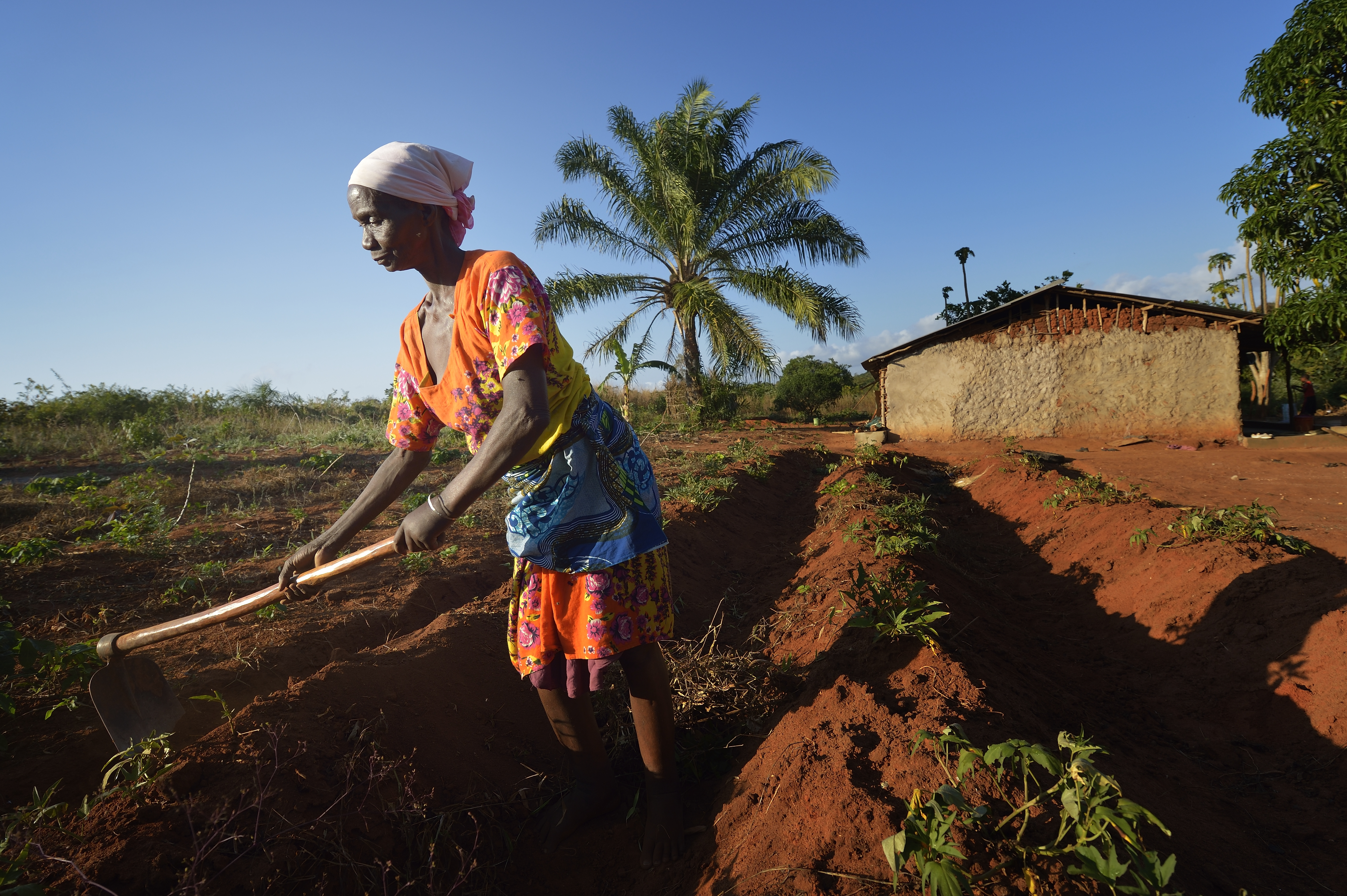
The Corus Effect
Founded in 1960, IMA World Health is part of Corus International, an ensemble of long-serving, global leaders in international development and humanitarian assistance committed to ending poverty and building healthy communities across Asia, Latin America and the Caribbean, the Middle East, and Africa.
In addition to IMA World Health, the Corus family includes global aid and development organization Lutheran World Relief, U.K.-based technology for development company CGA Technologies, impact investing firm Ground Up Investing, and direct trade company Farmers Market Brands.
Alongside communities and local partners in fragile settings, our dedicated experts across our organizations integrate disciplines, approaches and resources to overcome global health challenges, develop productive and stable economies, improve resilience in the face of climate change, and respond to natural disasters and humanitarian crises. We invest in solutions that are innovative, scalable, holistic and move the needle towards transformational change.




